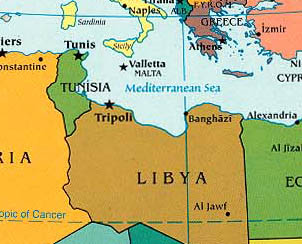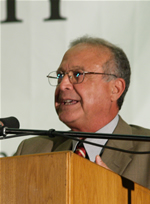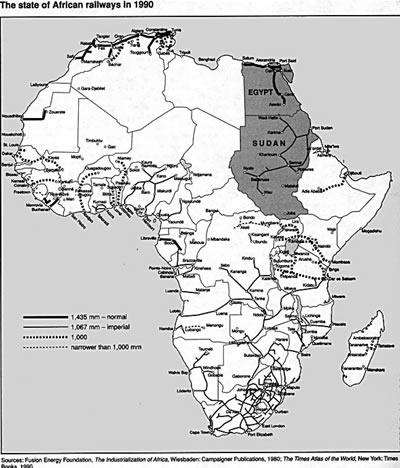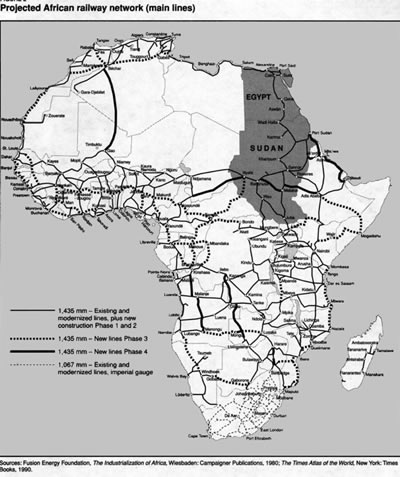Schiller Institute Conference September 15-16, 2007 Kiedrich, Germany Lyndon LaRouche and The Muslim World Prof. Ahmed Kedidi |
|
(Download MP3 audio in French, not translated)
Dr. Kedidi is a professor at Doha University in Qatar, a former Member of Parliament in his native country, Tunisia, and president of the European Academy of International Relations, Paris. Here is the translation of the written text of his speech to the Schiller Institute's conference in Kiedrich, Germany.
The Arab-Muslim world is at the antipodes of the universal project we are preparing at this conference, around Lyndon LaRouche. Currently, the Arab-Muslim world is the theater to many crises of separation and war among peoples, ethnic groups, communities, and classes, and while we here call for building bridges and corridors, the Arab-Muslim area continues to break apart, and new walls are put up between peoples.
For that very reason, I believe that Lyn's combat is more urgent here than anywhere else, and that Lyn's ideal is to have geography correct history's errors. The Muslim world has gone through several historical cycles, that have not only shaped its civilization, but also created several Muslim worlds, rather than a homogeneous entity. The present cycle, which began with the fall of the Ottoman Empire, is distinguished by the shift from faith to ideology, and from harmony among cultures to conflict. Hope means a fair and lasting solution to the Palestinian drama, a perspective of peace and freedom for Iraq, settlement of the conflict in Afghanistan, a return to the time-honored entente in Lebanon, and good governance in the Arab-Muslim world.
A 27-Year Friendship
I have known Lyndon LaRouche for a quarter of a century. Twenty-seven years of sincere, deep faithfulness tie me to this man, politically and morally.
I shall spare you labored analyses on his thinking, or diplomatic remarks and civilities suited to the occasion, and tell you some anecdotes about Lyn's (and of course Helga's) relations with the Muslim world, which is my field of specialty and culture.
In 1985, when I held important political positions in my native country, Tunisia, we were attacked by neighboring Libya—then a different Libya under a different Qaddafi than now. On a whim, the Libyan colonel threw 32,000 Tunisian citizens, legally living in Libya, out of the country, into the sands of the desert at our joint border, and we had to confront an unexpected, unforeseeable crisis, in a country with no natural resources, suffering from unemployment.
In this absurd situation, the Tunisian government headed by Bourguiba, was immediately supported, strategically and in the media, by Lyndon LaRouche, a man of honor and an experienced visionary. When I proposed to my friend, Tunisian Prime Minister Mohamed Mzali, to invite Lyn to Tunis, as a sign of gratitude and political efficiency, he asked our ambassador in Washington, Mr. Habib Ben Yahia (future Foreign Affairs minister), for his opinion. Strangely, our ambassador was not in favor of such an invitation. The Prime Minister transmitted that opinion to me, requesting me to contact the Ambassador for more information or his arguments. I called Mr. Ben Yahia, who gave me a significant, edifying report on Lyn's image and the meaning of his fight in the Arab-Muslim world. His Excellency told me, from his office in the U.S. capital:
You know, Ahmed, Lyn is a great economist and a prestigious U.S. Presidential candidate; his analyses are constantly confirmed by events and by history, but (because there is a "but"!), he is not liked by the U.S. Administration!


I insisted on knowing more, and finding out why there was no official sympathy for a man whom even our Ambassador held so highly. The Ambassador continued, explaining with obvious and audible embarrassment, that Lyn was not tender with the excesses and violence of Israeli policy, nor with the fatal errors in the international monetary system, the U.S. crisis management approach in the world, or the West's economic and financial decisions.
Upon hearing such praise, I replied that I thought Bourguiba's Tunisia should definitely invite this man and honor him! The Ambassador replied (to my great surprise):
Precisely because of his good qualities, we should be cautious and ... realistic, and avoid bringing down the wrath of the White House and the Pentagon!
Another memory. Throughout the 1990s, when I was a professor at Qatar University and political analyst on al-Jazeera and different Arab satellite stations, I would put out Lyn's message, and my friend Jacques Cheminade came to the Gulf to explain Lyn's ideas.
One day, I received a kind invitation to lunch from the French Ambassador to Qatar. Between the cheese and the apple pie, I said to him: Excellency, I know that when a good Ambassador invites someone to dine, his purpose is to obtain useful information, so what do you want to know about? He replied: your commitment to LaRouche. I asked him what he thought of LaRouche, personally. He answered: LaRouche seems to be alone. Then I said: Excellency, when speaking of de Gaulle, André Malraux wrote: There are two types of solitude, the solitude of a man who has been abandoned by others, and the solitude of the man who is ahead of all the others. The luncheon then continued on a different track.
In remembering those two episodes, all the absurdities of Arab-Muslim and European diplomacy toward Lyn, the just and the visionary, pass through my mind. I have fought against that nonsense for a quarter of a century, not for my friend and teacher Lyn, but essentially for the ideas and ideals of laroucheism, which, fundamentally, is humanism, and which contemporary history had once and for all hoisted to the level of a triumph of reason, of culture, of peace over fanaticism, racism, and all the injustice that threatens our world and confiscates our future.
Fortunately, today, from Jakarta to Tangier, the 1.2 billion Muslims in the world are living through an adventure of development and reconstruction, but the Arab-Muslim elites are aware of and acknowledge the fierce fight, day by day, of Lyn and Helga for the new Silk Road and for Islam's entry into history.
Related Pages:
More Speeches from the Schiller Institute Landbridge Conference
The LaRouche Doctrine for Mideast Peace (2004)
The Development of Africa by Lyndon H. LaRouche, Jr.
Maps of Great Infrastructure Projects
"Peace Through Development in Africa's Great Lakes Region" speech by Lyndon H. LaRouche, Jr.
Solidarité et Progrès à la télévision iranienne (in French, from Solidarité et Progrès)
Angloamerikanische Elite fordert "US-Empire" (in German, from BüSo)




